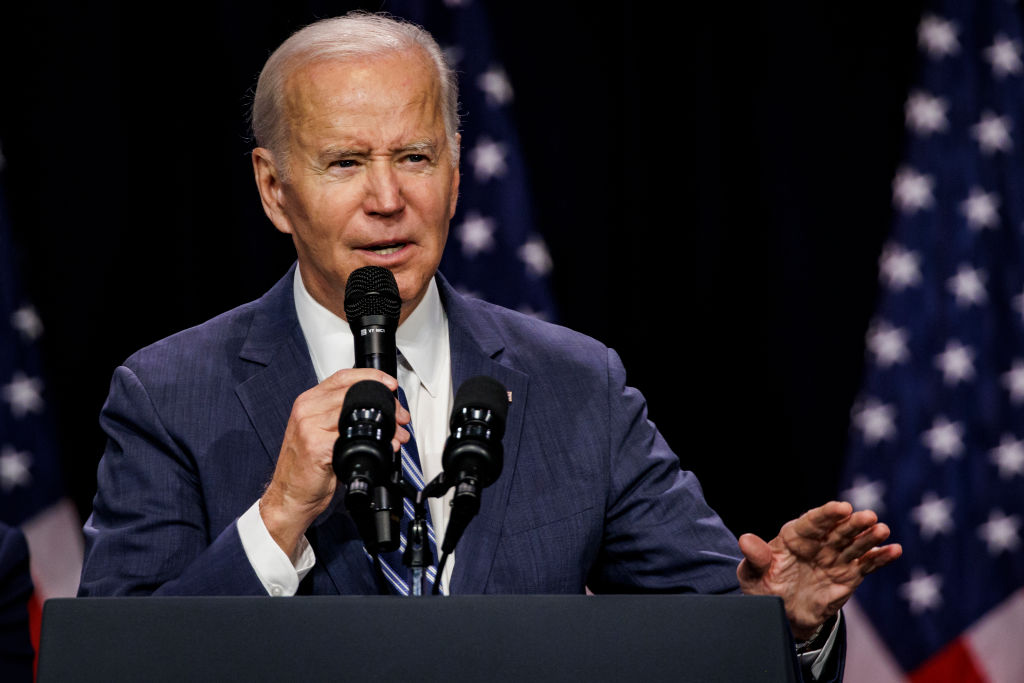Elections are an opportunity for us to deliver messages to political leaders most of us will never meet. We can’t send Donald Trump a text, nor can we talk about inflation over an extravagantly expensive Jeni’s ice cream cone with Joe Biden. The best we can do is to vote and hope that in our collective numbers we can make ourselves clear.
Yet early indications are that the leaders of both parties are poised to learn absolutely nothing from the midterm elections. Let’s examine some of their delusional reactions.
The White House hasn’t commented on whether Joe Biden played the recent $2 billion Powerball drawing (which CNN recently accused of being systemically racist), but if he didn’t buy a ticket, he should have. Lunch Bucket Joe blundered into a safe Senate seat fifty years ago this week, and served unremarkably for thirty-six years, representing the interests of credit card companies and Amtrak. Then he was improbably named vice president, an office that proved to be great for consulting businesses run by his son, Hunter, and his brother, James. As veep, on the most important occasion when Barack Obama asked for his input, he advised him not to undertake the raid that killed Osama bin Laden. He then became president by virtue of Trump fatigue, an adoring press that hid his gaffes, and the fact that he got to campaign from his basement thanks to the pandemic.
Now our soon-to-be-80-year-old president has survived the midterms comparatively unscathed despite his unpopularity, record inflation, record illegal immigration, and the fact that three quarters of the country think we’re on the wrong track. He should, but apparently doesn’t, understand that the results weren’t a vote of confidence in him. They were an expression of no confidence in many Republican candidates, dissatisfaction with the Dobbs decision and some of the red-state abortion laws that followed, and a general hesitance by independents to jump onboard a Republican train that’s still being piloted by Donald Trump.
Joe Biden took questions — really, he did — from the press, during which he practically took out a trumpet and played Happy Days Are Here Again. A reporter asked him what he might do differently in the next two years considering his poor poll numbers and the fact that his party probably just lost the House. “Nothing,” he said, “because they’re just finding out what we’re doing.” Another reporter referenced an exit poll indicating that two thirds of Americans don’t want him to run for re-election and asked what his message to them is. “Watch me,” he said.
So there you go. Darn it, he’ll teach us all a lesson and run for president whether we like it or not. And as out-of-touch and irrational as Biden’s response was, he almost made sense compared to Donald Trump’s post-election rants. Trump claimed Republicans were the victims of “obvious CHEATING!” and insisted that most of his endorsed candidates won. This conveniently ignored the fact that many were in safe seats and his hand-picked candidates performed poorly in most of the races that mattered.
Trump saved the bulk of his vitriol, not for Biden or Nancy Pelosi, but for “average” Ron DeSantis, who, as the Babylon Bee put it, selfishly “took the entire red wave for himself.” Trump’s characteristically juvenile rants about the man he dubbed “DeSanctimonious” are so petty and irrational they aren’t worth quoting. But suffice it to say that Donald’s big takeaway from the election is that DeSantis’s landslide was a lot more concerning than the Democrats’ surprisingly decent showing. This is because Trump’s fortunes are more important to him than those of his party or his country.
How about the Republican leadership? When asked about the red wave’s failure to materialize, Ronna McDaniel, chairwoman of the GOP, listed off a litany of Republicans who won and likened reclaiming the House to “winning the Super Bowl.” “This is a good night for Republicans and anybody saying otherwise is just wrong. When you win the game, you don’t say, ‘did you win by one point or two points?’ You won the game.” Actually, no, it wasn’t, and yes, you do.
McDaniel is obviously in spin mode. But part of being a leader is taking responsibility, not just behind closed doors but also publicly, so that Americans feel like you get it and their voices were heard. Rank-and-file Republicans have little confidence in McDaniel, McConnell and McCarthy. It would send a strong message to replace all three of them.
For his part, the delusional commander-in-chief needs to take a hint and understand he’s a lame duck who can’t win in 2024 unless Donald Trump is the GOP nominee — and even then he still might lose. Independents want to see the Democratic Party move toward a more moderate platform that includes tackling inflation, respect for taxpayers, and regaining control of the border.
Republican leaders should note that Florida’s abortion law, which has a fifteen-week limit, is in line with where polls show most Americans are, which is one reason Republicans went on a rampage there. Even more important, Republicans need to understand that having Trump as the party’s standard bearer is damaging their chances.
The choice for Republicans now is clear. Do they want a forty-four-year-old leader who just won by 20 points in a state he singlehandedly turned from purple to red? Or a seventy-six-year-old whom a majority of the country views unfavorably? Both parties seem too comfortable with a status quo that most Americans find unacceptable.


















